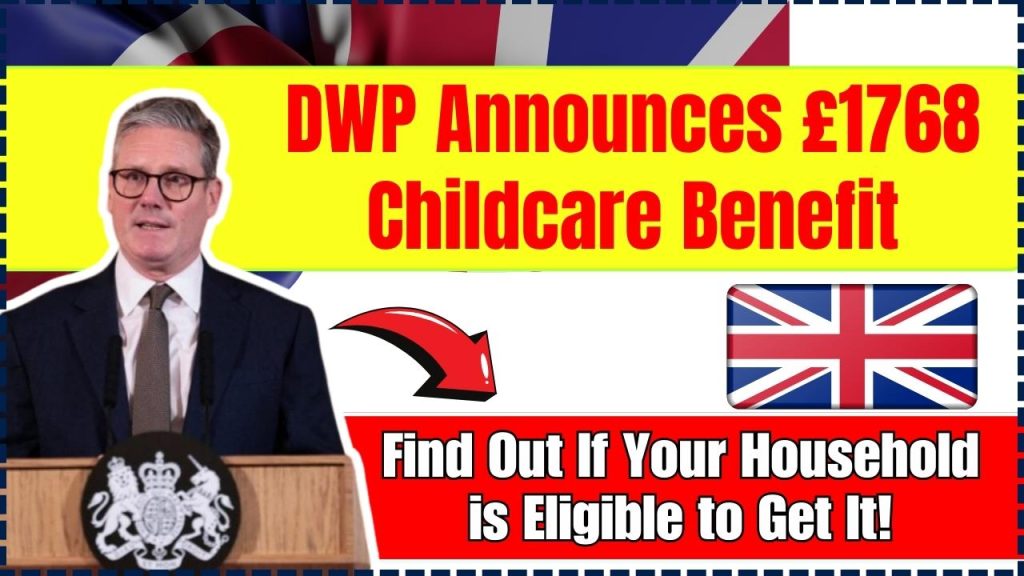£1768 Childcare Benefit: Childcare costs can be one of the most significant financial burdens for working parents. Fortunately, the Department for Work and Pensions (DWP) has recently introduced an increase in childcare support for families on Universal Credit. This new policy, which offers up to £1768 per month for childcare costs, aims to alleviate the financial strain on parents and support working households.

Whether you’re a parent managing a tight budget or a professional exploring government schemes, this comprehensive guide will break down everything you need to know about this benefit. We’ll cover eligibility requirements, application steps, and examples to help you understand how to make the most of this opportunity.
£1768 Childcare Benefit
| Details | Information |
|---|---|
| Maximum Benefit Amount | Up to £1,768 per month for two or more children |
| Eligibility | Parents on Universal Credit with children under 16 years old, using registered childcare providers |
| Application | Through your Universal Credit account or work coach |
| Additional Info | gov.uk |
The DWP’s enhanced childcare benefit under Universal Credit is a game-changer for working families. By increasing the monthly limit to £1768, the government aims to make childcare more accessible and affordable, supporting both parents and children alike. Whether you’re already a claimant or considering applying, this guide has equipped you with the knowledge to maximize this opportunity. With proper planning and timely applications, you can reduce your childcare costs and focus on what matters most—your family.
What Is the £1768 Childcare Benefit?
The childcare benefit under Universal Credit is designed to help working parents cover their childcare costs. Previously capped at £1739.37, the DWP has increased the monthly maximum to £1768, allowing families with two or more children to access more financial support. This policy acknowledges the rising costs of childcare and aims to encourage more parents to remain in or return to the workforce.
For households with one child, the maximum benefit remains at £1108 per month. These adjustments reflect the government’s commitment to supporting working families and addressing the growing demand for affordable childcare.
Why This Increase Matters
Childcare costs in the UK have been steadily rising. According to recent reports, the average cost of full-time childcare for a child under five exceeds £1250 per month in many regions. This increase in the benefit cap provides much-needed relief for families struggling to balance work and childcare expenses.
Who Is Eligible for the Childcare Benefit?
Key Criteria for Eligibility
To qualify for this benefit, your household must meet specific criteria:
- Employment Status: You and your partner (if applicable) must be in paid work. There is no minimum number of hours required, making the benefit accessible to both part-time and full-time workers.
- Income Limits: Your household income must not exceed £40,000 annually. This threshold ensures that the support reaches families who need it most.
- Child’s Age: The benefit is available for children aged up to 16 years. For children with disabilities, additional support may be available.
- Childcare Provider: Only costs incurred from registered childcare providers are eligible. This includes nurseries, childminders, and after-school programs registered with Ofsted or equivalent regulatory bodies.
- Universal Credit Recipient: You must already be receiving Universal Credit to apply for this childcare support. If you’re not currently on Universal Credit, you can explore eligibility and start your application online.
Additional Considerations
- Families who have recently transitioned to work from unemployment may also qualify for help during their adjustment period.
- Self-employed parents are eligible, provided they can demonstrate proof of income and childcare expenses.
How to Apply for the Childcare Benefit
Applying for this benefit is straightforward. Here’s a step-by-step guide:
Step 1: Verify Your Universal Credit Status
Ensure you are an active Universal Credit claimant. If not, start your application process on the official Universal Credit website. Submitting accurate income details and employment status will speed up your application.
Step 2: Select a Registered Childcare Provider
Only costs from registered providers are covered. Check the Ofsted database to verify your provider’s registration status. This step ensures your claim meets regulatory requirements.
Step 3: Gather Necessary Information
Keep records of your childcare payments, including receipts and invoices. You’ll need this documentation for your claim. If you’re self-employed, maintaining a clear log of your earnings and childcare expenses is crucial.
Step 4: Submit Your Claim
Log in to your Universal Credit account and report your childcare costs. Alternatively, discuss the process with your work coach for assistance. Providing accurate details ensures that your claim is processed without delays.
Step 5: Monitor Your Payments
Once approved, the benefit will be included in your monthly Universal Credit payment. Regularly check your statements to ensure accuracy. If discrepancies arise, contact your work coach promptly.
Practical Examples
Example 1: Single Parent with One Child
A single mother working part-time incurs £800 per month in childcare costs. She claims £800 through Universal Credit and receives the full amount, as it falls under the maximum limit of £1,108 for one child.
Example 2: Dual-Income Household with Two Children
A couple earns a combined annual income of £35,000 and spends £1900 per month on childcare for their two children. Under the new scheme, they can claim the maximum limit of £1768, significantly reducing their out-of-pocket expenses.
Example 3: Self-Employed Parent
A self-employed father spends £1,200 per month on childcare for his two children. By maintaining accurate records of his income and expenses, he successfully claims the full amount through Universal Credit, easing his financial burden.
Benefits of the Increased Support
The increased limit has numerous benefits for families:
- Financial Relief: Reduces the burden of high childcare costs, particularly in urban areas where costs are highest.
- Workforce Participation: Encourages parents to remain in or return to employment by making childcare more affordable.
- Child Development: Provides children with access to quality early education, laying a strong foundation for their future.
- Economic Growth: Supporting parents in the workforce contributes to overall economic productivity.
DWP Announces £165 Christmas Bonus After 20600 Sign Petition! Check Important Details
Up to £812 Available via DWP Budgeting Loans: Here’s How It Works
DWP Confirms PIP Increase for 2025: Check Eligibility and Payment Updates
Frequently Asked Questions About £1768 Childcare Benefit
1. How often can I claim the childcare benefit?
You can claim monthly as part of your Universal Credit payments. Ensure you report your childcare costs promptly to avoid delays.
2. What if my childcare costs exceed the maximum limit?
You will need to cover any amount above the maximum cap of £1,108 (one child) or £1,768 (two or more children) from your own pocket. Explore other schemes, such as employer-supported childcare, for additional help.
3. Are school-related costs covered?
No, this benefit applies only to registered childcare providers, such as nurseries, childminders, and after-school programs.
4. Can I use the benefit if I’m self-employed?
Yes, self-employed parents are eligible, provided they meet the other criteria. Accurate record-keeping is essential for successful claims.
5. How does this benefit affect other forms of childcare support?
You cannot claim this benefit alongside other government-funded childcare schemes, such as Tax-Free Childcare. Choose the option that best suits your financial situation.











